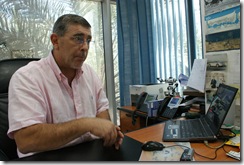When Info2Cell.com launched in 1998, it was the first Arab company to provide value added services (VAS) in the telecoms space. A decade on, it provides content to 30 mobile operators across the Middle East. Bashar Dahabra shares some of the challenges the industry faces

For many years in the late 1990s and early 2000s Info2Cell.com enjoyed a monopoly in the region. However, in recent years, as it has witnessed more content providers enter the regional market, Info2Cell has considered selling direct to consumers in a business-to-consumer (B2C) model through an Internet portal, as opposed to the traditional business-to-business (B2B) model, where operators market the services.
In 2003, Info2Cell became a 100 per cent subsidiary of Italian VAS company, Acotel, which has been successful in the B2C model through its website flycell.com, which was launched in the US and offers mobile content such as ringtones, wall papers, animation and music downloads direct to consumers.
“Acotel acquired business shortcodes in the US with the big mobile operators and went direct to consumers with a web portal. If you go to the portal, it’s an experience, it really has you engaged. An operator would not do that as well. In the B2C model the content provider is more aggressive in trying to reach the consumer,” Dahabra explains.
Dahabra has attempted to replicate the success of flycell.com with a Middle East version, but believes the low Internet penetration in the region limits the company’s efforts from reaching their full potential.
“It is promising, but B2C depends heavily on the Internet. The major differentiation between us and what Acotel have succeeded in doing in Europe and the US is Internet penetration. It’s a major show-stopper for us. In the US penetration is about 70 per cent, whereas in the Middle East is about 20 per cent,” Dahabra comments.
He sees the two major barriers to raising penetration levels as the relatively high expense of connection, as well as the mentality of parents that bringing the Internet into the home could expose children to harmful websites. That perception appears to be changing over time.
“Another challenge in providing content is being more creative in reaching out to women and raising awareness of value added services,” states Dahabra. “In the Arab World it is easy to focus on male-oriented services, but there is huge potential to cater more services for the female population.”
Dahabra believes the key lies in finding the right service for the right segment.

On any given day, Info2Cell.com has an average of 500,000 subscribers to all its services across its network of Middle East operators. For the breaking news SMS service, more than 30,000 subscribers pay AED4 (US$1.08) per week for two alerts per day. The revenue share is split 50/50 between operators and content providers, but according to Dahabra, this lags behind other regions.
“It could be better. In Europe the revenue share is more in favour of the content provider. Here the norm is 50 per cent, while in Europe the norm is 60-80 per cent for the content provider.”
Info2Cell.com is headquartered in Dubai Internet City (DIC) where its commercial and administrative team of 35 people operate, while a team of 60 developers and content editors work in Amman, Jordan. There is also a small team of five colleagues based in Saudi Arabia. The company’s platform infrastructure sits inside DIC though Dahabra admits that with the rising expenses in the city, the platform may be relocated to Jordan or elsewhere.
“One of the fundamental reasons we came to DIC in 2000 was that at that time, it provided the best Internet connectivity in the Middle East. So we were able to interconnect to all the mobile operators from a central hub and we based our platform on this. But eight years later, other countries are now providing similar Internet connectivity such as Jordan and Egypt. It’s becoming quite challenging to stay within Dubai because of the costs.”





0 comments ↓
There are no comments yet...Kick things off by filling out the form below.
Leave a Comment